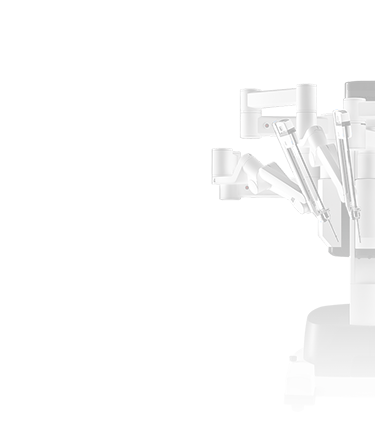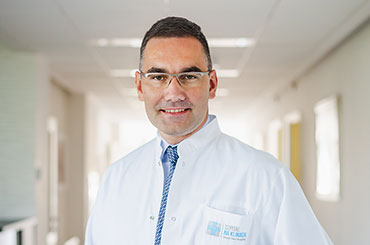The robot assisted surgery
Your partner in the struggle against illness
The Robotic Surgery Centre at Szpital na Klinach is the only one in south-east Poland that provides patients with access to the latest global technologies. The hospital has at its disposal the Surgical System of the latest generation, authorised by its manufacturer, Intuitive Surgical.
The Robot at Szpital na Klinach supports the work of doctors in gynaecological, urological and surgical procedures. The robot ensures precision, improves effectiveness and reduces invasiveness of the surgical procedure.


Contact the Individual Patient Assistant
Have you got any additional questions or would like to find out more about the robotic method, about the course of the treatment or the conditions that it concerns? We are at your disposal and can arrange an appointment for you to be seen by a specialist at our hospital.
The usage of robot in the surgical treatment
The most important benefits for the patient
Precise and minimally invasive procedure


MAXIMAL CONTROL AND SAFETY OF THE PROCEDURE
Shorter hospitalisation and recovery


FASTER RETURN HOME
Lower blood loss, minimisation of postoperative pain


GREATER COMFORT FOR THE PATIENT
Lower risk of infections and complications


PATIENT’S SAFETY IS MOST IMPORTANT
Treatment using a robot
Our specializations


Laparoscopic prostatectomy using the robot is currently the most technologically advanced method of prostate cancer treatment. In this method, the affected prostate gland is removed together with the seminal vesicles, in some cases also with the lymph nodes, by making six incisions in the abdominal wall through which the arms of the surgical robot are introduced into a patient’s body. The robotic technology enables anatomic resection of the prostate while maintaining the sexual function and urinary continence, with minimal blood loss. Recovery is shortened, hospitalisation is brief and a patient’s return to a daily routine is significantly faster compared to open radical retropubic prostatectomy.


Currently, the robotic colorectal surgery is the most technologically advanced method of colorectal cancer treatment. It consists in removing a tumour or the affected organ through several apertures, one-centimetre in size, made in the layers of a patient’s abdominal wall through small incisions via which miniaturised surgical instruments are entered into the patient’s body. Unlike the classical technique, the robotic method offers an option to perform surgeries without having to open up the abdomen, which reduces postoperative pain and minimises the risk of infections and complications. Further, the application of the robotic surgery in colorectal cancer treatment promotes faster recovery and return to professional activity, and produces a better cosmetic effect.


The robotic hysterectomy is a method used to remove benign lesions and carcinomas of the uterus. It is the most advanced surgical technique of removing the uterus, ovaries and lymph nodes, while at the same protecting autonomic nerves, in the early stages of cancer. All over the world, this is the most common operation using a robot. Robot-assisted surgery enables gynaecologic oncologists to perform minimally invasive, precise and complete procedures with good oncological clearance. The robotic surgical system allows for the application of minimally invasive surgery, which reduces postoperative pain and blood loss, and also substantially shortens hospitalisation time.




Bariatric surgery
Using the robotic surgical system, we perform bariatric procedures such as by-pass, sleeve, resection or implantation of a gastric band. With the application of the robotic system, patients undergo a minimally invasive surgery limited to just several small incisions in the abdominal wall. Thanks to a magnified, 3D high-definition vision system and special miniaturised instruments, surgeons can perform bariatric surgeries with increased precision, dexterity and control over the surgical area. The use of the robot involves a number of benefits for a bariatric patient, such as a low ratio of complications and infections and gastrointestinal leakages, and therefore the minimised risk of any subsequent surgeries.
News and announcements
Nie znaleziono żadnych postów.

 +48 785 054 460
+48 785 054 460 




















